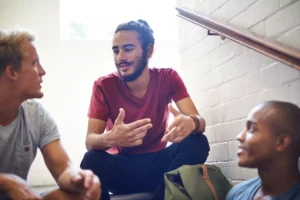Not long ago, I was playing Scrabble with a close friend on a Friday night. As we placed tiles on the game board and chatted about everything from her pregnancy to my desire to declutter my house Marie Kondo-style, her housemate came home from work.
My friend and her husband rent the loft in their home to a single friend. We chatted a bit with him, and he thanked her for cleaning the guest bathroom. As he headed up to his quarters, the two housemates said, “I love you” to one another in the most natural, sibling sort of way. After he left, I exclaimed, “One big happy family!” And we both laughed.
Truth be told, I couldn’t remember the last time I said those three little words to someone … or received them. On occasion, I may say “love ya” quickly at the end of a phone call. I write “love” before my name in closing out a card and text a yellow heart emoji from time to time. But “I love you” spoken so freely? The instances were rare to non-existent.
Desiring Relationship
For singles who live alone, particularly those of us long past the college years, it can be a challenge to feel known. Unless we’re in a dating relationship, we may go weeks, months or more without physical touch beyond a handshake. We aren’t hugged when we’re happy, or held when we’re sad.
We make dinners for one. We vacation alone. We show up to church on Sundays solo, and sit by ourselves at weddings and funerals unless we happen to find a friend to join us. Even friendships can be tricky to navigate as careers build, responsibilities mount and children are born and raised.
Connection beyond the surface requires determination and follow-through. It’s simply not built into our lives the way it is for our married, married-with-children, or single-parent friends who live in community — even a community of two. Although I realize people can share space and be disconnected, it’s also true that singles like me who don’t put forth some serious effort will suffer from a lack of, well, togetherness.
With this in mind, I’m trying to be deliberate in noticing opportunities to engage with the people around me in meaningful ways. Perhaps the person before me struggles with loneliness or needs to be seen as much as I do. In a world that has never been more technologically connected, we’re frequently void of the “repeated spontaneous contact” that fosters deep, healthy, vulnerable relationships.
How can we better connect with the people around us? Here are a few ideas I’ve found helpful.
Look Up and Engage
I remember the first time I saw the 2014 spoken word video Look Up. As I watched it, I nodded my head enthusiastically. The video went viral for good reason. It’s well done, and contains useful points about disconnecting from technology in favor of real relationships.
Many of us have good intentions to pay attention to the people around us, but do we follow through? I didn’t this past weekend. At a local bakery, I recognized a woman one table over. She attends my church and I’ve met her at a baby shower. I wanted to say hi, but I couldn’t remember her name. Instead of going over and saying, “Excuse me. Are you Tiffiny’s sister? I’m sorry that I can’t remember your name. I’m Lindsay,” I choked. I missed the opportunity.
Too often I intend to engage, but find myself pulling out my smartphone instead. In Ephesians 5:15-16 Paul writes,
“Look carefully then how you walk, not as unwise but as wise, making the best use of time, because the days are evil.”
Pastor and commentator Steven J. Cole notes one of these ways to be wise is to take advantage of the opportunities God gives you.
‘…making the most of your time’ is literally, ‘redeeming the opportunity.’ The idea is, being alert to the spiritual opportunities that God brings your way, so that you grab them as a wise merchant grabs a bargain. The reason that you are alert to these opportunities is that you are living wisely, with a view to eternity and God’s kingdom. As Paul puts it (2 Corinthians 4:18), ‘we look not at the things which are seen, but at the things which are not seen; for the things which are seen are temporal, but the things which are not seen are eternal.’
Perhaps giving the people around us our full attention is a start in “seeing” the unseen. We do this as we engage in meaningful ways with those who cross our path.
Shared Experiences
I’ve noticed that making friends becomes more difficult with age. Connecting with peers is typically easier from childhood through the college years than it is in adulthood. Whether being on the same sports team or sharing a dorm room, school years provide proximity and shared activities that create the perfect environment for friendships to bloom.
In contrast, the responsibilities of adulthood can choke out the time required to invest in friendships. As David Roberts writes,
“Friendships are things we choose to do. And that means, when time constricts and things get busy, friendships often get bumped.”
In the busyness of life, it’s easy to disengage from friendships if we don’t prioritize time with the people we love.
And while social media helps us feel connected, research shows that we are more lonely and disconnected than ever before. When I think of my “in real life” friends, what holds us together is shared experiences — going out for brunch, hanging out at each other’s houses, attending events together. This interaction is different than what my online friendships can provide. These relationships are more satisfying and go deeper.
Maintaining friendships is not always easy. I’ve watched my friends’ lives change through the years as they marry, raise children, build careers, care for aging parents and face chronic illness. I often flex and bend my single girl life to keep these relationships active. While it doesn’t always feel fair, I have found that the benefits of sharing experiences and creating memories with a couple of close friends is worth it.
Give and Receive Help
Looking up from our phones and cultivating shared experiences are two important ways to make connections. Another meaningful way to engage with others is through giving and receiving. Numerous verses in Scripture instruct us to give and share, including Acts 20:35, which famously quotes Jesus saying, “It is more blessed to give than to receive.” As Christians, we ought to look more and more like Christ, the ultimate sacrificial Giver, every day.
But some of us may actually have more difficulty receiving than giving. I’ve never been more aware (and honestly, convicted) of my need to “let others in” than in the past year when I developed chronic health issues. I’m not used to receiving help, let alone asking for it.
But I was desperate for help in multiple areas. I wanted someone to sit with me in the waiting room before undergoing tests and procedures. Bills began stacking up, the sum total over and above what I was able to pay after applying health insurance and draining my savings. I physically didn’t have the energy or strength to keep up with housework due to pain and exhaustion. In those moments, my people showed up. I saw God’s hand of provision again and again through them.
I now understand the joy of receiving with gratitude and grace. I don’t want to deny others the blessing God gives them for their faithfulness and generosity. As they obeyed the Holy Spirit’s prompting “to help the weak” (Acts 20:35), they became the answer to my prayers.
To Know and Be Known
When it comes to building meaningful relationships, I’m ready to be “all in.” I always thought a dating relationship would be the avenue through which I learned to be vulnerable, take risks and reach out, but that’s not the case. God has shown me that connection is a basic human need; after all, we are created in the image of our triune, communal God, who knows us fully.
As I look around I can see many God-ordained opportunities to know others and allow them to know me. Now is the time to take action. That means less time on my phone, and more coffee dates, good conversation and games of Scrabble. My friend and her roommate helped reveal my need for connection. And for that I am forever grateful.
Copyright 2017 Lindsay Blackburn. All rights reserved.











